Hotel and Hospitality technology trends to implement
In the past decade, the hotel and hospitality industries have undergone some major changes. For example, travel agencies, are practically obsolete and are now all digitized. These days, customers expect some form of technological amenities—whether it’s for booking their stay or features to enhance their stay. In hospitality, every advantage counts.
It’s safe to say that hotel and hospitality technologies can help improve businesses, management, and increase customer interest and revenue. They can also help mitigate guest complaints.
Hotel and hospitality owners should keep a close eye on these emerging trends in order to stay ahead of the competition.
In this article, we will go over hospitality technology trends that business and hotel owners can implement today. Below are some of the trends rising in hotels today:
Keyless entry or digital keys have already been rolled out in many hotels, such as the Hilton and Marriott, while also being piloted by Hyatt and InterContinental Hotels Group. The idea is that guest can use their smartphones to download the hotel’s app and use the app as their key. Other app features include the ability to book and select their room of choice and select early or late check-in. These digital keys also allow front desk staff to time doors to open upon a guest’s arrival as well as track who has entered a room at what time—providing additional insights and analytics into a guest’s stay and behaviors.
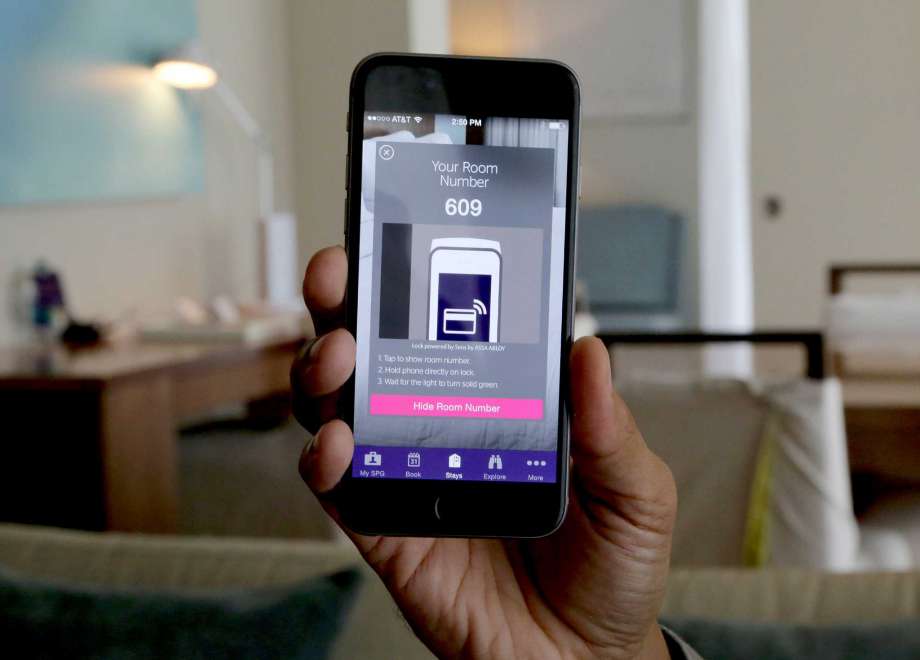
The interest in mobile keys has increased due to technology-loving guests like Millennials and Gen-Z. Other appealing benefits of a keyless entry include increases security, reduced cost of producing keys, and environmental benefits. In fact, this study showed that 63% of guest would prefer a mobile key solution.
Software
Today, many hotel operators are implementing software that can help streamline business operations such as managing hotel staff and communication. In this industry, managers are challenged with multi-location management as well as providing the utmost customer service. Since managing a hotel is a non-stop commitment, employee management software has become a vital tool in the success of hotels.
With hotel employee scheduling software, there is no need for paper or Excel spreadsheet, or even multiple systems to keep track of your employees. Employee management software Deputy can help your business schedule employees, integrate with your choice of payroll, assign and track tasks, and easily communicate with an entire staff directly from your smartphone. When you streamline your business and HR operations, you can place a greater focus on more important aspects of your business.
The relationship between customers and hotels has completely changed thanks to social media. Apps like Instagram have evolved to more than just sharing pictures between friends. Social media is now a way for customers to interact and form an opinion on a hotel. Now, hotel and hospitality organizations should utilize social media to market and capture the attention of potential guests.
Scrolling through social media has become a daily part of life for many people. A way to capture the attention of potential guests is to create content that inspires them to want to travel. Furthermore, users also use social media and review websites to read reviews and comments about the hotel. According to SiteMinder, almost all tourist under 34 years of age turn to Facebook for suggestions before finalizing the booking.

Now more than ever, hotel owners need to work hard to exceed expectations and resolve any service problems. The threat of receiving a bad review could damage customer perspective as well as future revenue. Having a strategic social media plan can help attract customers and keep them happy. One way to appeal to potential customers is to pair with a social media influencer. A social media influencer can promote your hotel to their audience, providing a new channel to market. Check out this blog to learn how to utilize social media influencers.
As Artificial intelligence (AI) and Chatbots become more advanced, we will see more complex algorithms to perform complicated tasks. Simply put, Chatbots are defined as artificial intelligence programs that conduct conversations with humans through the chat interface. Chatbots can make the customer experience personal and available 24/7 without the cost of hiring a customer service team.
There are already many chatbots that hotels use to help their current and potential customers. Popular travel companies like Expedia and Kayak have launched bots of their own on Facebook Messenger and Slack, which helps travelers book their hotels.
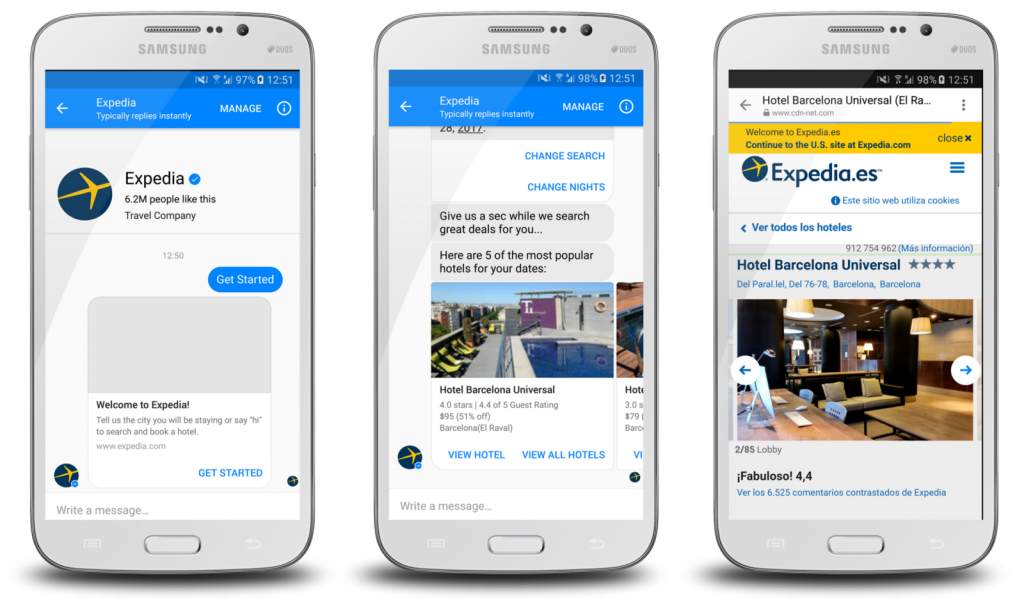 Chatbots capability to respond with one-click to a question will undoubtedly improve the customer engagement response rate. From a business perspective, chatbots can have many benefits and advantages for your hospitality organization.
Chatbots capability to respond with one-click to a question will undoubtedly improve the customer engagement response rate. From a business perspective, chatbots can have many benefits and advantages for your hospitality organization.
Smart room technology enables guests to customize their experience by controlling lights, temperature, entertainment, room service, requests, and other settings from a tablet or the guests’ own devices.
Amazon recently announced Alexa for Hospitality which uses the Amazon Echo (also known as Alexa) device to enhance the in-room experience. Using Alexa, guest can ask for hotel information, contact the concierge, request services like housekeeping, play music, set alarms, and more. The device can also be configured by the hospitality providers to allow guests to control and adjust in-room devices like lights, thermostats, blinds, and TVs.
Another innovative in-room technology that is gaining popularity is smart mirrors. These mirrors not only serve as a traditional mirror, but it also acts as a ‘digital concierge’. With touch activation, guests are able to control room functions, watch and listen to a range of content, and interact with the hotel. The mirror can also serve as a revenue generator, allowing the hotel or third-party companies to display ads.
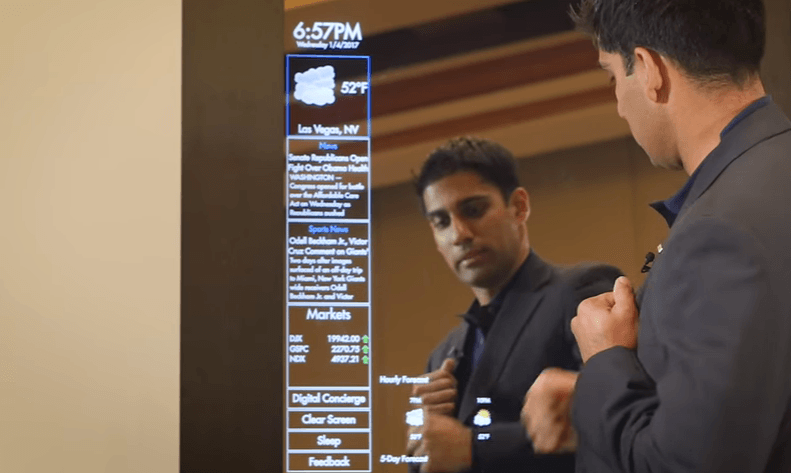
If you need another reminder that we’re living in the future, then look no further. Robotic Butler’s have slowly been rolling out in hotels all over the world. Boutique hotel Yotel currently uses a working droid named YO2D2 as a service robot. The purpose of these robotic butlers is to deliver meals and drinks directly to the customer’s rooms. These robots can deliver anything around the clock, making customer service available at all times. In fact, the hotel’s robot not only is capable of delivering items to guests, but it can also store and manage their luggage (up to 300 items of luggage a day!). Watch the robot in action in this video clip.
Yotel’s robot is a customized product from the company Savioke. The tech startup is best known for specializing in robot solutions for the hospitality industry. YO2D2 isn’t the only robot working at the Yotel hotel. At the Singapore Yotel, the Yoshi and Yolanda robotic butlers are running around making deliveries to guests.
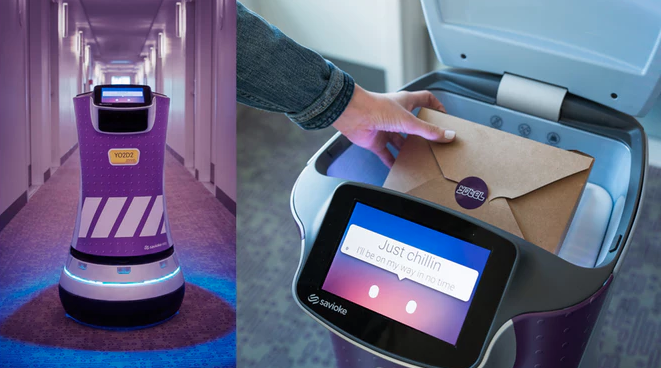
Hotels aren’t just for vacation. Many corporate and businesses often arrange meetings, conduct presentations, and organize conferences. Technology will only make the meeting experience better, drawing in more attention and guests. In the next couple of years, technology in conference rooms will be standard. Hotels are already implementing strong, high-density WiFi as well as high-tech presentation tools.
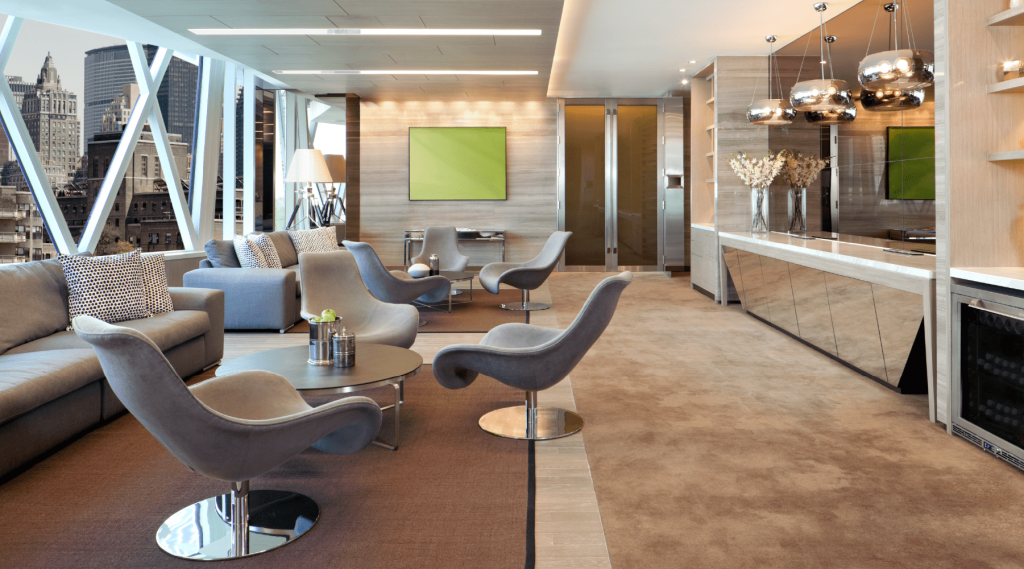
Tech lounges will also be seen in many hotels, enabling guests to relax, get extra work done, and access Wi-Fi. With the world having shifted online, hospitality organizations that incorporate this technology will greatly benefit since guests now include the availability of these technologies in their online hotel search and criteria. In fact, in an Oracle survey, 59% of respondents said that modern hotel designs that included more meeting areas, wall TVs, and gaming lounges would enhance their experience.
Increasingly, more workers are remote and able to work from anywhere. Therefore, the demand for flexible workspaces is at an all-time high. Hotels are in the perfect position to welcome these changes. Many hotels could even open up their services to non-guest, allowing anyone to rent space to work or hold a conference.
The race for autonomous vehicles has been going on for some time now. These self-driving cars will impact almost every industry including retail, restaurants, and hospitality. There are already over two dozen major companies that are developing their own self-driving vehicles such as Tesla, Google, and Mercedes Benz.
It’s obvious that these driverless cars will change the way people travel and commute. But how will it change the hospitality industry? It’s predicted that as many as 10 million self-driving cars could be in use as early as 2020. Because of the anticipated boom in autonomous vehicles, transportation will be cheaper, faster, and easier. This means that more people will travel more frequently to nearby destinations. More travelers and increased tourism should benefit hotels and companies like Airbnb that also provide lodging. Even restaurants could benefit from more frequent travel.
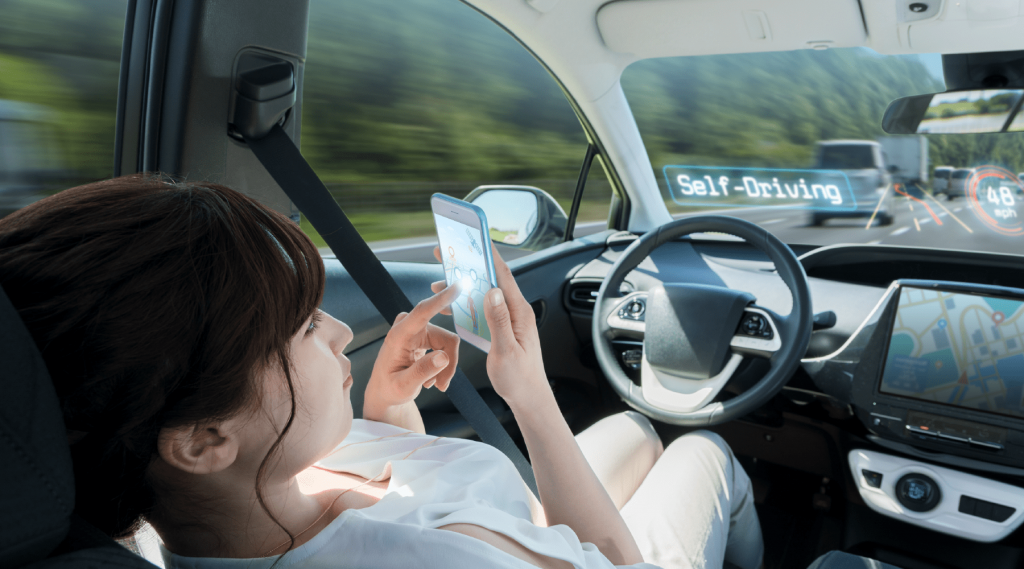
However, this technology could also compete with the hospitality industry. More people will choose to sleep in their cars instead of resting at a hotel during a long road trip. Hotel owners should watch this hospitality technology to prepare for this type of change.
Looking to the future
Technology is not just about improving the guest experience, it’s also improving the way a hotel runs. With all these incredibly large choices of new and exciting technologies that are constantly being created, it is always important to choose according to your organization. Even more so, it’s important to make sure that they are easy and suitable to use for all of your guests.
Understanding what needs to be changed is one thing, but predicting how customers might react to certain changes is another thing. The best thing for hospitality businesses is to provide the utmost customer service by keeping your staff productive and well-trained. Automation can help both businesses and customers. It’s critical to utilize technology that will best fit your organization.
Employee management software can help increase productivity and efficiency by reducing the amount of manual labor needed to schedule and train with the capability of performance management. Not only will you have a more efficient staff, but you will also save money on labor costing. See if Deputy is right for you by scheduling a call with a rep here.
